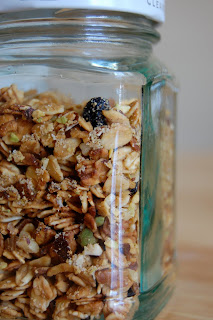Homemade and wholesome...
4 cups old-fashioned rolled oats
1/3 cup water
1/8 cup OR 2 tbsp extra virgin coconut oil
(OR expeller-pressed canola oil)
1/3 cup water
1/8 cup OR 2 tbsp extra virgin coconut oil
(OR expeller-pressed canola oil)
1/8 cup OR 2 tbsp local honey
1/8 cup OR 2 tbsp agave nectar
1/8 cup OR 2 tbsp sorghum or molasses
1 tsp vanilla
1/2 tbsp cinnamon
After baking, add about one or two handfuls of each:
walnuts
pecans
dried blueberries (or your choice of dried fruit)
1/4 cup toasted wheat germ
liquid ingredients and flavorings warmed in a small saucepan over low heat...
then mixed with oats...
baked at 300F for 20-30 minutes...
(stirred once or twice during baking time)
nuts, wheat germ, and dried fruit added after baking...
...then enjoyed over thick, creamy Greek yogurt with some honey drizzled on top.
Have a great day!
* Tip: You can also use just one type of sweetener instead of the 3 different ones listed above. I used those because that's what I had! You can use all maple syrup, all honey, etc. Just use 1/4 cup plus 2 tablespoons. Or you can use brown sugar (turbinado or demerara sugar), dissolved in the 1/3 cup water.
* Another tip for measuring oil and liquid sweeteners: Measure the oil first, then use the same measuring cup or spoon to measure the liquid sweetener, so none of it sticks to the cup/spoon!





4 comments:
mmm looks yummm mia!
Hi Anne! Great to see you here :)
Yes, it really was yummy!!!
One word, Mia. One word. FEDEX! Ngayon din!
When considering the root of the word yoga, it is easier to grasp its original intention.
Originating in India, Yoga is in actuality not just something, but some things. The ancient
practices that are still utilized today are believed to offer great insight and spiritual
enlightenment as to the very nature of existence, through a process of deep meditation. It has
many ties to personal beliefs as well as popular world religions.The dates of such a practice
have been traced as far back as 3000 BC, where archaeologists have found multiple seals of the
Indus Valley Civilization depicting individuals and god-like beings in meditative postures. As
early as 900 BC, ascetic practices were recorded in the Brahmanas, part of the Vedas.As time
passed, evidence of practices in the Hindu religion became more prominent. This was especially
true, as this concept of what is now considered "yoga" continued to grow and change as is
evidenced in the middle Upanishads c. 400BC. Further "defined" by the Bhagavad Gita (c. 200BC),
which translates to "The Song of the Lord" and which offers the first glimpse of a "codified"
yoga, the book included many meanings to the modern term, yet focused on on three: Karma Yoga,
Bhakti Yoga and Jnana yoga.
Post a Comment